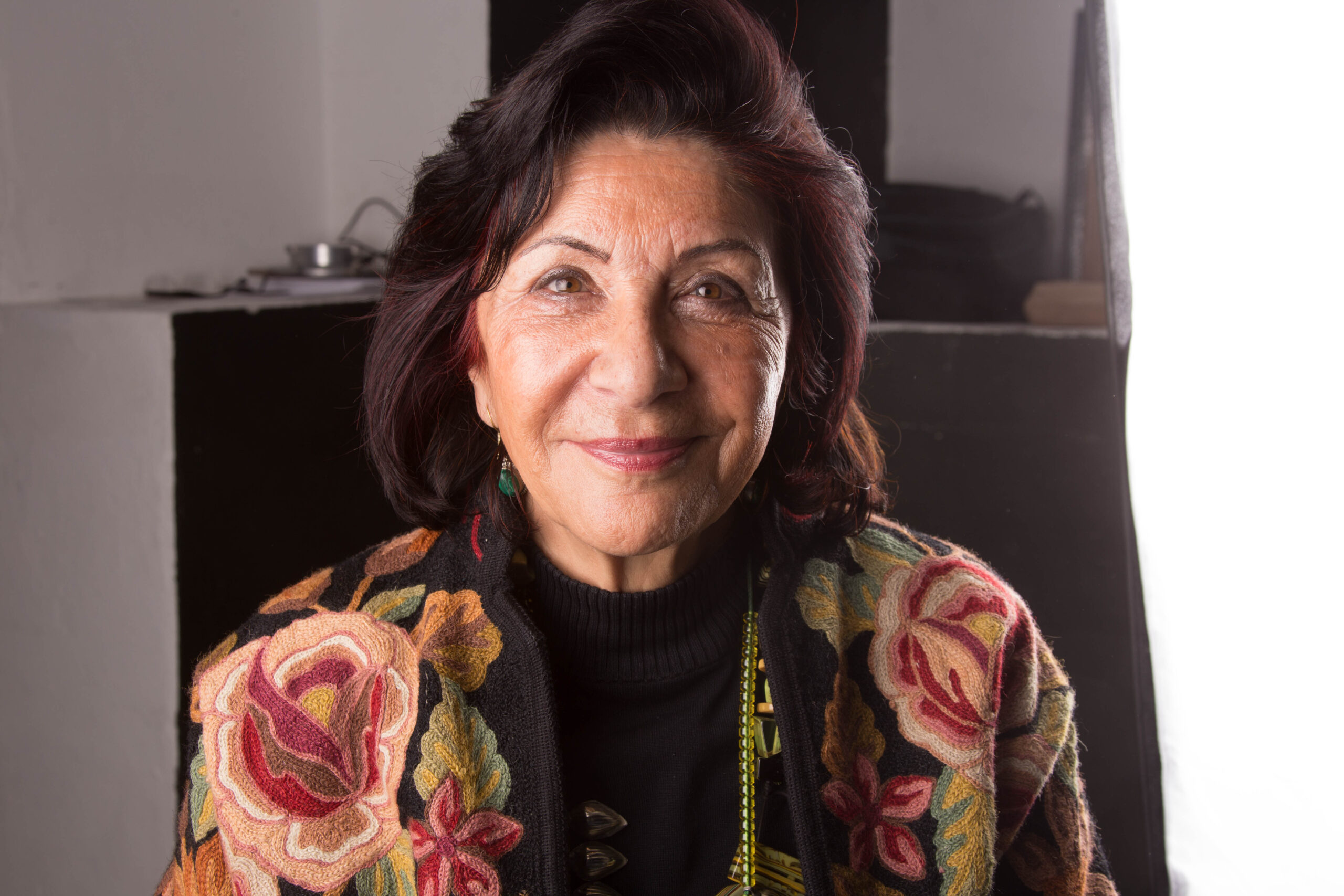Dr. Parto Teherani-Krönner’s (1948–2023) unconventional approach to feminist and intersectional perspectives in agriculture and horticulture has inspired a great number of scholars and students. On July 3rd, 2024, the Division of Gender and Globalization at Humboldt-Universität zu Berlin held a workshop commemorating Parto. Colleagues, friends, and students celebrated her as an inspiring scholar and mentor for gender studies and culturally sensitive methodologies.
Prof. Dr. Christine Bauhardt (Gender and Globalization, HU Berlin) and Dr. Gabi Jähnert (Center for Transdisciplinary Gender Studies, HU Berlin) opened the workshop with heartfelt words, reflecting on Parto’s crucial role in establishing the Division despite institutional obstacles. She convinced the Center to finance a professorship and thus to boost gender research and teaching at the agricultural faculty in the long run. Parto challenged patriarchal norms by emphasizing women’s agency in food provisioning, countering the widespread idea of rural women as vulnerable victims. The workshop highlighted Parto’s impact in three academic areas:
- Rural women in development
- Meal cultures
- Human ecology
1. Rural Women in Development
Due to the patriarchal system in agriculture, women in rural areas worldwide have had to confront numerous challenges over time.
For instance, women’s roles in East German agriculture underwent significant changes during unification, with East German women disproportionately affected, as outlined by Dr. Uta Hoffmann (Women in Rural Development, HU Berlin). These women were forced into early retirement or short-term jobs in other sectors, which led to a decrease in their autonomy. Familiar collective structures were replaced by unfamiliar norms of competition and economic stress. Women, especially mothers, faced barriers to reenter the labor market. Unemployment rates reached up to 40% in some rural areas with single mothers in particular faced with even fewer job opportunities. While some younger, high-skilled women migrated to West Germany, other women initiated grassroots projects with alternative employment opportunities. The unequal material situation of East German women with agricultural backgrounds persists to this day, affecting pensions and overall lifestyle development.
Today, only 11% of farm managers in Germany are women, revealing the patriarchal structures within agriculture. Janna Luisa Pieper (Rural Sociology, Georg-August-University Göttingen) shared insights from the Federal Ministry of Food and Agriculture (BMEL) project „The life situation of women on farms in German rural areas – a socio-economic analysis“. On a short side note: conducted in 2019, this was the first nationwide study on women farmers in Germany. The study identified three main paths for women to access farming: inheritance, marriage, or starting a new farm, with two of these paths linked to men. An interviewee’s quote highlights these limitations: „Marry a farmer or win the lottery“. Gender norms are inherent to agricultural practices and policies, affecting women’s access to farm ownership and management positions. Clearly, systematic change in gender relations is necessary to increase women’s decision-making power and access to farm ownership.
Interdisciplinary approaches and international partnerships in agricultural studies are necessary to develop more effective, culturally sensitive strategies to address gender inequalities in rural areas. Prof. Balghis Badri (Regional Institute of Gender, Diversity, Peace and Rights, Ahfad University for Women, Omdurman, Sudan) presented the enriching collaboration between HU Berlin and Ahfad University for Women in Omdurman, Sudan. In that, she stressed Parto’s personal engagement in learning local customs and demonstrated how hands-on, cross-cultural experiences enhance the quality, methodologies, and outcomes of scientific work.
2. Meal Cultures
The fact that it is often women who prepare meals highlights the cultural and gendered aspects of food. Parto’s concept of meal cultures emphasizes that food sovereignty includes the ability to access and prepare food. Her ideas significantly influenced projects like the Federal Ministry of Education and Research (BMBF) project HORTINLEA, which focused on diversifying food systems in East Africa. Prof. Gülay Çağlar from Freie Universität Berlin, a former research associate at the Division of Gender and Globalization, shared an anecdote from Nairobi in 2013. She illustrated Parto’s calmness and social skills in chaotic situations, which benefited academic outcomes. Dr. Susanne Neubert (Centre for Rural Development, HU Berlin) who also cooperated in the HORTINLEA consortium brought to the fore Parto’s approachable and charismatic personality. In her manner, Parto brought uncomfortable but essential perspectives to the research project, such as post-colonial power relations that were inherent in this research endeavor.
Dr. Meike Brückner (Gender and Globalization, HU Berlin) further elaborated on Dr. Parto Teherani-Krönner’s methodological innovations and her emphasis on understanding everyday life in critical food studies. Parto loved to put together meals and used to share and enjoy them with other people. Thus, Meike and Parto conducted cook-along interviews with Kenyan women and used the kitchen as a laboratory of knowledge production. In her analysis of the socio-cultural context of food, Parto outlined the complex interplay between ecology, culture, gender and economics. She always underlined that humans do not consume raw agricultural produce. Instead, people have meals that need to be prepared in a culturally and socially appropriate manner and knowledgeable women form an integral part of this. She was convinced that women feed the world and not big agribusiness.
3. Human Ecology
Human Ecology is an inter- and transdisciplinary research network, integrating diverse knowledge and ethical considerations. Parto viewed it as a pioneer of holistic research and a crucial framework for sustainability science. Dr. Angela Franz Balsen (Leuphana University Lüneburg), a colleague from the German Society for Human Ecology, described Parto as a researcher who introduced gender into the human-ecological discourse, a dedicated teacher, and a colorful, cooperative, and courageous character who was “critical, yet fair, ambitious but never arrogant.”
Dr. Dang Tung Hoa (German Society for Human Ecology), Dr. Parto Teherani-Krönner’s first PhD student and later colleague, highlighted Parto’s influence of including gender aspects in forestry research and natural resource management. She also shared personal impressions, noting Parto’s supportive nature and genuine interest in diverse cultures.
Unconventional thinking and empathetic actions
In her emotional closing remarks, Dr. Jill Philine Blau (Development Studies, Friedensau Adventist University) painted a vivid picture of Parto as a vibrant, joyful person who brought curiosity and laughter to academia. Her unconventional approach and feminist and intersectional perspective transformed students’ perceptions and continues to inspire new generations of scholars. Despite the unfortunate news that the Division of Gender and Globalization will not continue in its current form, the call to uphold Parto’s legacy of holistic, culturally sensitive, and gender-aware academia remains strong.

Selected publications of Parto Teherani-Krönner:
Teherani-Krönner, Parto and Hamburger, Brigitte (Hg.) (2014): Mahlzeitenpolitik. Zur Kulturökologie von Ernähung und Geschlecht, oekom Verlag, München.
Teherani-Krönner, Parto and Wörteler, Brigitte (Hg.) (2008): You can’t clap with one hand! Gender research and networking. Vol. A (Frauen, Gesellschaft, Kritik, 46), Centaurus-Verlag, Kenzingen.
Teherani-Krönner, Parto, Hoffmann-Altmann, Uta and Schultz, Ulrike (Hg.) (1999): Women and Sustainable Rural Development. III International Workshop: Women in Rural Development, Centaurus Verlag, Pfaffenweiler.
Teherani-Krönner, Parto (2006): „Landwirtschaft“. In Braun, Christina v.; Inge Stephan (Hg.) Gender Studies. Metzler, Stuttgart, 2 Auflage, pp. 211-224.
Title image:
Portrait Parto Teherani-Krönner. Foto: Harald Bulling
Lorena Unger is studying for an M.Sc. in Geographies of Global Inequalities at the Freie Universität Berlin, Germany. Her research focuses on social and ecological justice in food systems. She holds a BA in Liberal Arts and Sciences (Albert-Ludwig-Universität Freiburg).

